What are Digital Differences?
When researching this topic, I was interested to find out; whilst digital inequality continues to expand globally in many directions, the relationship between online inequalities being affected by offline inequalities is yet to be fully recognised. To begin to understand how inequalities affect access I evaluated my personal digital differences.
Figure 1: Figure created by Megan Padgett
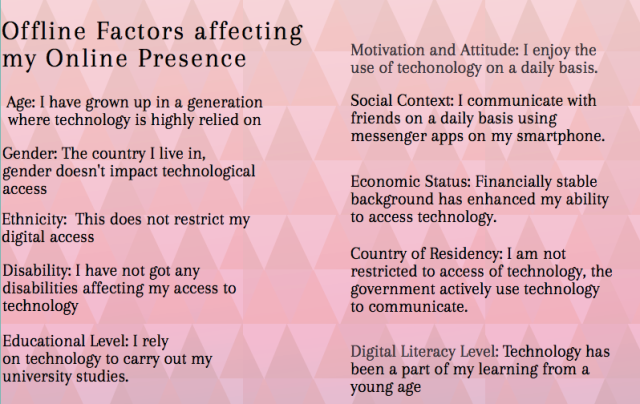
I would like to focus on three important factors contributing to inequality that I believe effect people in my close environment:
Gender:
After reading Lauren Bates’ article on sexism I recognised that although personally I have not been at a disadvantage, gender may play a bigger role in digital differences that I originally thought.
I incredibly lucky to be able to freely access the internet, voice my opinion in communities and not be criticised but others may not have it the same and their negative experiences may influence their online presence.
Table 1: Data collected from We are Social comparing the gender facebook usage around the world showing women are still significantly underrepresented in their digital access.
Table created by Megan Padgett
| Facebook Gender Balance | |||
| Highest Female Ratio | |||
| # | Country | % of population | Female Users |
| 1 | Belarus | 58 | 1,200,000 |
| 2 | Ukraine | 57 | 7,400,000 |
| 3 | Moldova | 56 | 560,000 |
| 4 | Russia | 56 | 20,000,000 |
| 5 | Latvia | 55 | 7,700,000 |
| 6 | Venezuela | 55 | 3,200,000 |
| 7 | Kazakhstan | 55 | 94,000 |
| Highest Male Ratio | |||
| # | Country | % of population | Male Users |
| 1 | Yemen | 85 | 2,000,000 |
| 2 | Afghanistan | 84 | 3,000,000 |
| 3 | Chad | 82 | 230,000 |
| 4 | South Sudan | 82 | 150,000 |
| 5 | Niger | 81 | 27,100,00 |
| 6 | Pakistan | 77 | 192,300,000 |
| 7 | India | 77 | 1,300,000 |
Disability
Whether mental or physical disabled, technological access remains restricted. This may be due to difficultly learning or requiring special technology that is not available outside their home.
‘The extra costs faced by disabled people, estimated to be on average £550 more a month.’
Disability may affect an individual’s working competence thus economic status. Therefore, expensive specialist technology required may further hinder technological access entering a downwards spiral of digital exclusion and contribute to the outcome of Figure 2.
Figure 2: Data gathered from the Office of National Statistics in 2017
Figure created by Megan Padgett
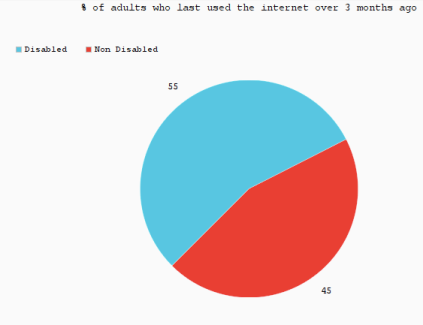
Economic Status:
Growth in 2017’s internet users has been driven by more affordable smart phone and mobile data plans which, in the future may reduce the digital divide. But as the technological world continues to develop, this certainly will not remain the case.
Figure 3 is statistics about internet access and devices used globally which have emerged from the improvement in affordability.
Figure 3: Data collected from We Are Social
Created by Megan Padgett
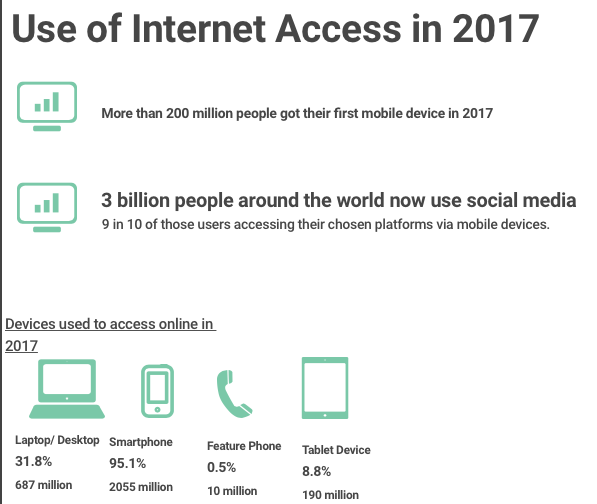
Figure 4: Info graph collected from We are Social
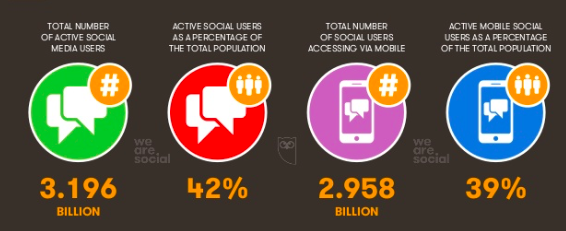
Aleph Molinari recognises the importance of bridging the digital divide. He argues that the internet should be a human right in his TED talk.
Video from Youtube
Word count : 309
References
Robinson, L., Cotten, S.R., Ono, H., Quan-Haase, A., Mesch, G., Chen, W., Schulz, J., Hale, T.M. and Stern, M.J., 2015. Digital inequalities and why they matter. Information, Communication & Society, 18(5), pp.569- [Accessible via: 582. http://www.tandfonline.com/doi/abs/10.1080/1369118X.2015.1012532]
Kemp, S. (2018). Digital in 2018: World’s internet users pass the 4 billion mark – We Are Social. [online] We Are Social. Available at: https://wearesocial.com/blog/2018/01/global-digital-report-2018 [Accessed 23 Feb. 2018].
Bates, L. (2017). What I have learned from five years of Everyday Sexism. The Guardian. [online] Available at: https://www.theguardian.com/lifeandstyle/2017/apr/17/what-i-have-learned-from-five-years-of-everyday-sexism [Accessed 20 Feb. 2018].
Watling, S. (2011). Digital exclusion: coming out from behind closed doors. Disability & Society, 26(4), 491-495. [Used to discover source below]
Rust, E. (2015). How the internet still fails disabled people. The Guardian. [online] Available at: https://www.theguardian.com/technology/2015/jun/29/disabled-people-internet-extra-costs-commission-scope [Accessed 22 Feb. 2018].
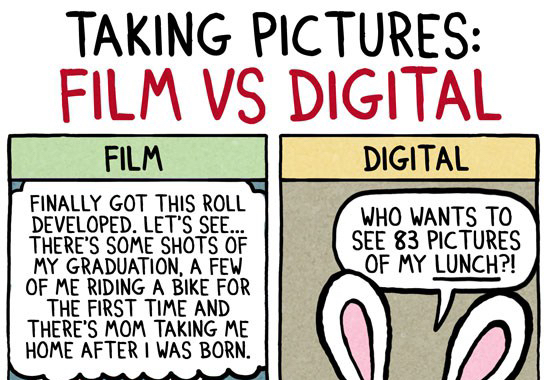
Hi Megan,
Really great blog post – great variety of multimedia aspects, I really liked the quotes being in a separate box – it helps to place emphasis on the right bits!
I too was distressed by Laura’s article on the effect that gender can have in internet usage. It seems strange that in our modern society, it is still such a pervasive issue.
Do you think there are ways which we can better prevent this kind of abuse?
Should the responsibility fall on individual states (which may be difficult due to the internet disrupting the notions of traditional borders between countries)?
Or should it fall upon the platforms/providers like Twitter to either prevent the comments coming up (moderation) or to take them down effectively (their policy is described here ?
Alternatively, do you think that any imposition of regulation from above will be thwarted by the decentralised nature of the internet, and that the issue would be best targeted through education?
I think I prefer the education approach, as it actually targets the root of the issue, but interested to hear your thoughts!
Thanks
Tom
LikeLike
Im flattered by your thoughts on my post!
Sadly, unless there is a way to be able to strip the internet of all negativity then no, I don’t. I do think, however, that its important to understand that we live in a world where there are people who will not like something you are doing just out of spite.. If you dont like the response you get from something either don’t post anything or just post even more to annoy them further!
I truly think its the reality of the cruel world we live in.
Bet you weren’t expecting that response
I like the thought of approaching via the education side of things, but have we not had lessons on cyber bullying and how to use the internet since we could walk?
There needs to be a way to tackle this but sadly, I have not got the answer.
I want to know if you think I am being too pessimistic and think we can approach this.
Megan
LikeLike
Hi Megan,
A really interesting and enlightening read! I especially like the way in which you have focused on three factors contributing to inequality effecting people in your close environment and the TED talk was a great contribution! Do you also believe the internet is a human right as Aleph does?
The way in which you highlight the inequality in gender is particularly interesting. Even though I, like you, have faced no trouble exercising my right to free speech online, it is shocking to think women in other countries are affected by their gender so much that they remain significantly underrepresented in their digital access!
Of these three factors do you have one you feel trumps the rest in terms of contributing to equality, or do you feel they are all equally matched?
I look forward to reading further posts and hearing back from you!
Nikhita
LikeLike
Thanks for you comment, I do think that the access to internet is a human right which has evolved over the last few years, if not, knowing how to use technology such as the internet should be. As generations progress, there is a greater shift towards the online world e.g. doctor surgeries using online services more frequently to book appointments. I think something that shocked me was the video I will link down below about the homework gap that appears between kids and their ability to carry out their homework being weakened due to having no access to the internet.
Another important aspect I observed over research, is the importance of needing internet access to carry out jobs such as obtaining a job. Placements that I have applied for, for over the summer have all been online.. If I did not have the access to applications I could potentially enter a downwards cycle of deprivation because it could effect my future career.
https://www.google.co.uk/url?sa=t&rct=j&q=&esrc=s&source=web&cd=2&ved=0ahUKEwicyc6xmsfZAhWDyKQKHXDxCwIQtwIILzAB&url=https%3A%2F%2Fwww.youtube.com%2Fwatch%3Fv%3DyqkAlwGsxwE&usg=AOvVaw1irUnl8FAmTQJ7i2KcWf26
To answer your second question, I think that in my personal position.. the aspect that would contribute to the greatest inequality is gender. But i think for others it may vary. what about you?
LikeLike
Hi Megan,
Thanks for the reply.
Thank you for the link to the video! It was very informative and shocked me also! For example, I was unaware 70% of teachers assign homework that requires access to the internet but that 5 million families with school aged children do not have access to high speed internet at home, therefore putting them at a disadvantage. It seems quite shocking in such modern and western countries that such a huge divide still exists!
I also agree with your opinion. Each factor can subjectively affect individuals but to myself gender would be the most important factor contributing to equality. However, it is interesting to see how a person’s circumstances may cause their answer to be different to ours!
LikeLike
Pingback: Reflection: How to tackle digital inequality? – Tom Paterson
Pingback: Reflecting on Our Digital Differences – Nikhita's Blog